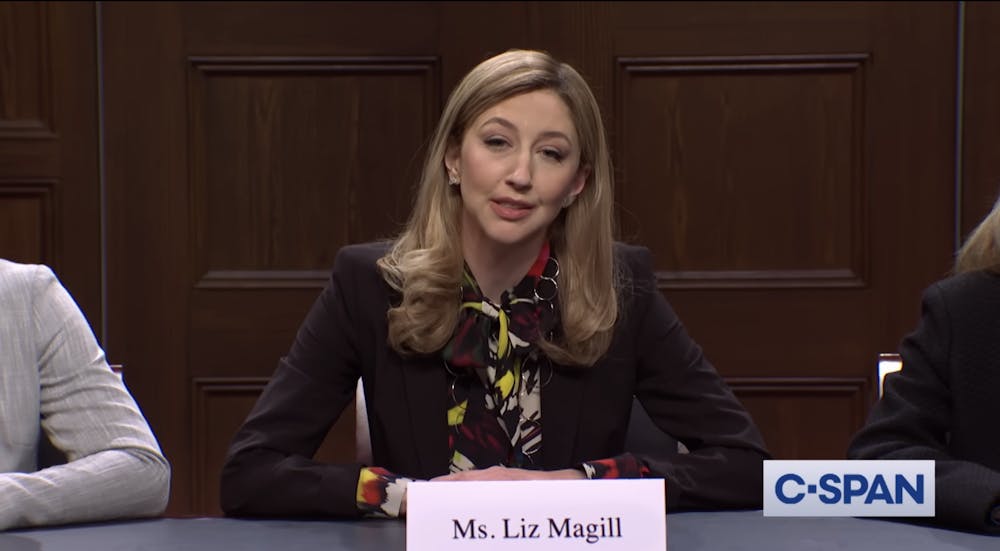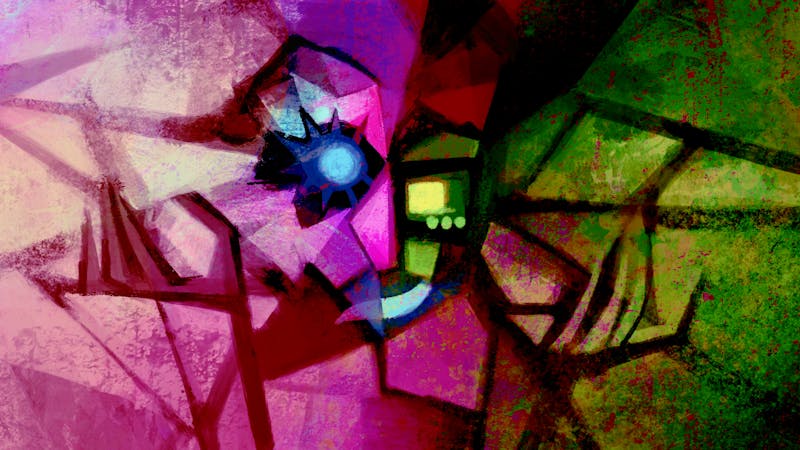If you’re a Penn student, you’ve probably spent the last few days waiting with bated breath as the congressional hearings about antisemitism on college campuses and Liz Magill’s resignation make top national news. You stalk the The Daily Pennsylvanian Instagram account, and your inbox is flooded with email after email discussing Scott Bok, Magill, Julie Platt, and the state of our campus. This is to be expected after such an unprecedented turn of events. But we didn’t expect our president to be the subject of a Saturday Night Live cold open.
While some students celebrate Magill’s resignation after she failed to confirm that calling for Jewish genocide is against Penn’s code of conduct, others mourn free speech and allege that wealthy donors forced Magill out after she answered a question with the only legally correct answer.
But no matter what side you’re on, SNL makes fun of you. The spoof features Chloe Troast as Rep. Elise Stefanik (R–N.Y.) who is overly excited to screech at the university presidents. She tears into the three about their handling of the rise of antisemitism on campuses since the Israel–Hamas war broke out in October. “I am here today because hate speech has no place on college campuses,” Troast says, bouncing up and down in her chair. “Hate speech belongs in Congress, on Elon Musk’s Twitter, in private dinners with my donors, and in public speeches by my work husband, Donald Trump.”
Heidi Gardner plays our very own Magill, Chloe Fineman plays Massachusetts Institute of Technology President Sally Kornbluth, and Ego Nwodim plays Harvard University’s Claudine Gay (yes, there’s the obligatory joke about her last name). Troast poses broad questions to the three presidents, which they answer with even broader platitudes—speaking “not from the heart, but from the thesaurus,” as Nwodim puts it.
Bowen Yang as Rep. Mark Takano (D–Calif.) poses a few more questions to the presidents, asking how they would discipline a student if they “poisoned the water supply.” Nwodim responded that if they “poisoned it with diversity, that could be wonderful.”
Randomly around minute five, Kenan Thompson appears, playing the president of the online University of Phoenix—that probably fake school you see on billboards and pop–up banner ads. He can’t denounce antisemitism either: “Well, my campus is the internet, so antisemitism is kind of our most popular major. And our mascot is porn!”
After some more jokes about diversity, equity, inclusion, and “context–dependence,” the skit is over in about six minutes. In less than two days, it’s accrued over 1.4 million views on YouTube, and a whole host of comments, tweets, and articles about how and why viewers think it's offensive and not funny. Most say it’s making light of a serious situation or that it's just not good writing. One of the top comments reads: “This sketch was very similar to the university president[s] themselves: afraid of offending someone, thus pissing off everyone.”
But while these jokes may be new to the rest of America, they’re not new to anyone who’s stepped foot on Locust Walk this week. They pile onto the preexisting heap of Sidechat and Under the Button posts. They’re reminiscent of comments overheard during conversations in dorm rooms and classrooms.
And while some of the punchlines fall flat, SNL got one thing right: the absurdity of the entire situation. Even though it's horribly serious, it’s difficult not to realize how preposterous it is that three elite institutions have gotten themselves swirling down this rabbit hole. The hypocrisy of the actual ordeal, not just the skit, is almost humorous. Stefanik, a Trump loyalist, won’t denounce his antisemitic remarks but grills “liberal” institutions over their responses to antisemitism. Magill, a law professor, focuses on legality in her answers, backing herself into a corner despite her ever–updating action plans. Then, the donors scream for her eventual resignation. But as Harvard professor Steven Pinker says, “It's like firing the coach when your team isn't doing well. It kind of feels good … It doesn't solve the problem.”
And so the high–profile mess is sadly comedic itself—and SNL just capitalizes off it. We do too in our own conversations. When all sides have screwed up, one thing we still have power over is our own laughter, no matter who or what we choose to laugh at.
Welcome, SNL, to the dark microcosm of Penn humor.






